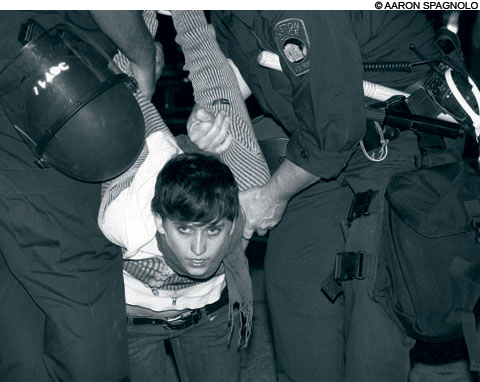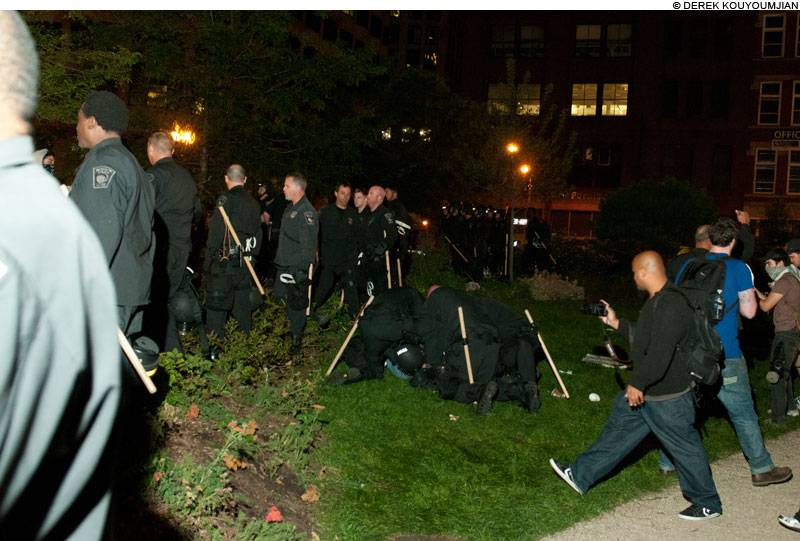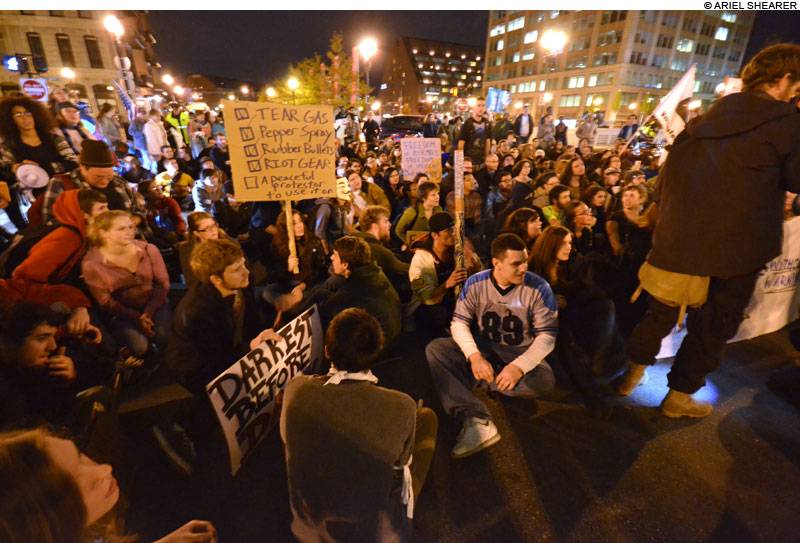
First
of all, I want to say that everyone feels just awful about the polite
woman who lives in Harbor Towers, and who had to sit in traffic for a
full half-hour one day last Fall on account of Occupy Boston marching
down Atlantic Ave. In a way, she's a bold representation of all the
apathetic martyrs who've been inconvenienced by the countless people
who are standing up for jobs and civil rights. I can only imagine how
much courage that it took for her to air out her complaint today at
Suffolk University, where the law school's Rappaport Center held a
roundtable addressing how cities nationwide have responded to Occupy.
The
forum was led by Brooklyn College Professor Alex Vitale, whose work
on police response and crowd control pre-dates Occupy Wall Street,
but has taken on a whole new significance since September 17. Vitale
has crunched numbers – relative to the nature of patrols and
arrests – that he culled from news reports, which he presented
today along with info on some general hallmarks of
police-versus-Occupy showdowns nationwide, such as the hypocritical
tendency to condemn protesters for sanitation while at the same time
denying them the tools to clean camps.

Vitale
offered a heap of intriguing research, the most interesting of which
was a well-thought dismissal of theories claiming that coordinated
crackdowns – ordered by federal authorities – were orchestrated
nationwide against Occupy. While there's anecdotal evidence to the
contrary – conference calls that were held between mayors, for
example, as well as the direct involvement of Homeland Security
operatives at some encampments – Vitale's point, that cities do
what they do when they want to do it, certainly makes sense.
Especially in Boston, where everyone knows that Hizzoner calls the
shots.
While
the mayor didn't make the Suffolk talk, two city lawyers were on hand
to lob weak arguments at Ben Wish, an attorney with the firm Todd &
Weld who represented Occupy Boston in its quest to keep police out of
Dewey Square. At one point, Boston assistant corporation counsel
Raquel Webster went so far as to allege that the city had to evict
Occupy Boston, since MassCann organizers were vying for similar
long-term accommodations for their Freedom Rally on the Common. “They
wanted to stay there forever and smoke marijuana,” said Webster,
straight-faced.
Boston
Police Department Superintendent-in-Chief Daniel Linskey, the force's
designated lead man for Occupy Boston, also came to voice his side of
events. In line with the BPD's relatively sensitive treatment of
Occupiers – particularly in comparison with out west – Linskey
handled the situation professionally, even making the crowd laugh
several times throughout his talk. Any Dewey Square expats who were
looking for a compliment from BPD finally got one: “The members of
Occupy Boston,” admitted Linskey, “actually did a good job of
policing themselves.” His main complaint, however, was the
movement's lack of a central contact point and its total
unpredictability. Tell me about it brother!

As I
observed in several West Coast cities, police brutality against
peaceful protesters is a whole different, much more despicable animal
in places like Oakland and Seattle. Vitale confirms what many have
hunched about the foul crackdowns on the Pacific; since authorities
in Washington were caught off guard in 1999, during the massive and
effective protests against the World Trade Organization, they've
adopted increasingly aggressive pre-emptive tactics. More than a
decade later, in 2012, storm trooper get-ups are the norm in many
places, though some cities, including Boston, were smart enough
during Occupy to dress their enforcers in baseball hats, while
keeping the riot gear nearby just in case.
This sort of forum is essential – particularly in a place like the Hub,
where relations between authorities and protesters remain somewhat civilized. Still the bigger issue is completely
unresolved, as I've yet to see a symposium where bankers answer for
their behavior, and where mortgage hucksters discuss their response
to Occupy. At one point, Linsky said that his officers were simply
doing their jobs, enforcing the law. I would argue that such an
arbitrary process of holding only some citizens accountable for
perceived crimes is irresponsible if not classist, as cops have gone
pretty damn lightly on the crooks in the skyscrapers above Dewey
Square. As a society, we seem to be past that conversation. But that
doesn't make it any less important.
















